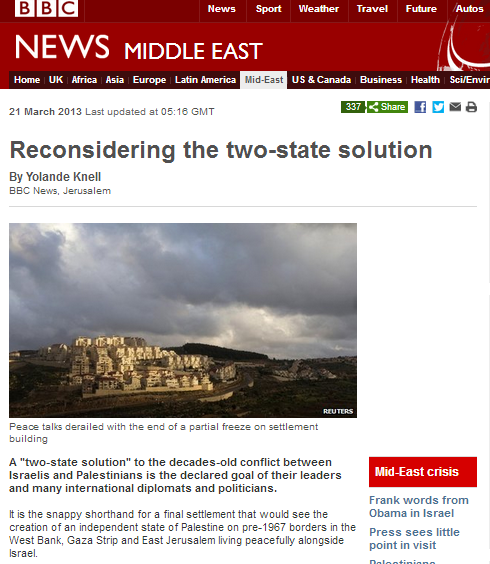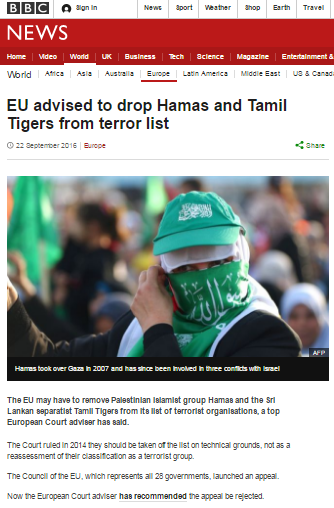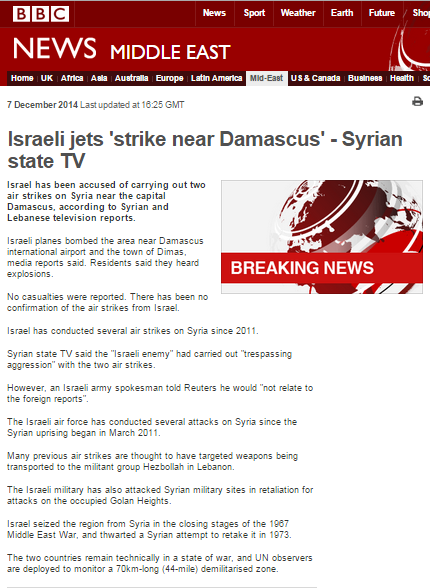Under the very broad umbrella of BBC coverage of Barack Obama’s visit to Israel (my count at the time of writing is up to twenty-one articles and a dedicated Twitter feed in less than 48 hours), the BBC News website slipped in an item entitled “Reconsidering the two-state solution” by the Jerusalem Bureau’s Yolande Knell on March 21st. 
So numerous are the inaccuracies, mistakes and distortions in Knell’s piece that they will have to be unravelled one by one. Knell begins:
“A “two-state solution” to the decades-old conflict between Israelis and Palestinians is the declared goal of their leaders and many international diplomats and politicians.
It is the snappy shorthand for a final settlement that would see the creation of an independent state of Palestine on pre-1967 borders in the West Bank, Gaza Strip and East Jerusalem living peacefully alongside Israel.” [emphasis added]
This is far from the first time that the BBC has erroneously presented the 1949 Armistice Lines as “borders”, despite the fact that the Armistice Agreement specifically states that they are not.
“Article II
With a specific view to the implementation of the resolution of the Security Council of 16 November 1948, the following principles and purposes are affirmed:
1. The principle that no military or political advantage should be gained under the truce ordered by the Security Council is recognised;
2. It is also recognised that no provision of this Agreement shall in any way prejudice the rights, claims and positions of either Party hereto in the ultimate peaceful settlement of the Palestine question, the provisions of this Agreement being dictated exclusively by military considerations.
Article VI
9. The Armistice Demarcation Lines defined in articles V and VI of this Agreement are agreed upon by the Parties without prejudice to future territorial settlements or boundary lines or to claims of either Party relating thereto.”
In making the claim that the Armistice Lines are borders and in using the term “East Jerusalem” (also repeated in this BBC article relating to the Obama visit), Knell is opening her article with an unquestioning adoption of the Palestinian narrative which compromises her report’s impartiality from its very beginning. Knell’s equally erroneous claim that the concept of the two-state solution relates to the creation of a Palestinian state on an area of land pre-determined by what she mistakenly terms “pre-1967 borders” ignores the fact that under the Oslo Accords, the subject of borders was left to final status negotiations, along with the subject of Jerusalem (and others) and is another unquestioning adoption of the Palestinian narrative – also in clear breach of BBC editorial guidelines on both accuracy and impartiality.
Knell continues:
“But many experts, as well as ordinary Israelis and Palestinians, now believe the two-state option should be abandoned or at least reconsidered.”
Who or how many make up Knell’s “many experts”, audiences are not told and neither are they informed of the nature of those experts’ credentials. Particularly in light of the fact that Yolande Knell saw fit to showcase the ‘one-stater’ anti-Israel activist Ali Abunimah less than a month ago, it is vital that BBC audiences be afforded the opportunity to judge for themselves whether the “expert” opinions Knell uses as a basis for her suspect claims are indeed such, or just mere common or garden anti-Israel campaigners – as is very often the case with proponents of the one-state ‘solution’.
Next – once again faithfully reproducing the Palestinian narrative – Knell informs readers that:
“Twenty years after the breakthrough Oslo Accords there is no sign of a final agreement.
Meanwhile, the construction of Israel’s barrier in and around the West Bank and the expansion of settlements on occupied land make a Palestinian state less possible.”
Let us remind ourselves of just what Knell had to ignore in order to make that statement. Seven years of terror between the 1993 Declaration of Principles and September 2000 followed by the Second Intifada. The 2007 violent Hamas coup in the Gaza Strip – meaning that the Palestinian Authority has no control over either part of the Palestinian population or a significant part of the territory designated for a Palestinian state. A Palestinian president whose mandate to sign anything on behalf of the Palestinian people expired years ago and an unelected prime minister – both of whom are well aware that the next elections could well bring a Hamas take over of the Palestinian Authority.
And yet Knell feeds her audience the dumbed-down notion that it is the anti-terrorist fence and Israeli building plans which are making the creation of a Palestinian state “less possible”, and does so without making it clear to her readers that neither the Declaration of Principles nor the Interim Agreement (‘Oslo II’) prohibits or restricts building in towns and villages in Area C, and that Israel has proven track record of settlement evacuation when peace really was on the cards. Knell also neglects to mention that, as Israelis saw after they removed all Jewish inhabitants from the Gaza Strip in 2005, doing so is no guarantee of peace or an end to the conflict.
Knell goes on to say:
“On Israel’s left and far right in particular, as well as among Palestinian activists, there is renewed talk of a one-state solution.
The Palestinian Islamist movement, Hamas has never officially dropped its claim to a single state in all of historic Palestine.”
That first sentence should of course actually read “on Israel’s far left”. Except for a handful of far-Left extremists, the Israeli Left – in line with mainstream Israeli opinion as a whole – remains committed to the two-state solution and Jewish self-determination. With regard to Knell’s curious use of the word “officially” in the second sentence, she apparently missed the publication of a Hamas policy paper the day before her own article went live in which some of the 19 official Hamas positions presented include:
“1. Palestine from the river to the sea, and from north to south, is a land of the Palestinian people and its homeland and its legitimate right, we may not a waiver an inch or any part thereof, no matter what the reasons and circumstances and pressures.
2. Palestine – all of Palestine – is a land of Islamic and Arab affiliation, a blessed sacred land, that has a major portion in the heart of every Arab and Muslim
3. No recognition of the legitimacy of the occupation whatever; this is a principled position, political and moral, and therefore do not recognize the legitimacy of the Israeli occupation of Palestine, and recognition of “Israel” and the legitimacy of its presence on any part of Palestine no matter how long; and it will not be long, God willing.
4. Liberation of Palestine is a national duty; it is the responsibility of the Palestinian people and the Arab and Islamic nation, it is also a humanitarian responsibility in accordance with the requirements of truth and justice.
5. Jihad and the armed resistance is the right and real method for the liberation of Palestine, and the restoration of all the rights, together with, of course, all forms of political and diplomatic struggle including in the media, public and legal [spheres]; with the need to mobilize all the energies of the nation in the battle.”
Knell then goes on to state:
“Under heavy US pressure, Israel’s Prime Minister Benjamin Netanyahu made a speech in 2009, in which he first committed to a “demilitarised Palestinian state”.”
One presumes Knell is referring to the June 14th 2009 Bar Ilan speech (in which a lot more was actually said than that) made some ten days after, and partly in response to, Barack Obama’s Cairo speech. As for her claim of “heavy US pressure”; Knell provides no evidence for that assertion.
She continues:
“A year later, peace talks between Israel and the Palestinians were revived but then quickly derailed with the end of a partial freeze on Jewish settlement building.”
Here, Knell of course neglects to mention that for nine months of the ten-month building freeze, the Palestinian Authority wasted time by refusing to come to the negotiating table and that the new precondition of a construction freeze (which the PA had never ‘needed’ before in order to negotiate) was the suggestion of the rookie Obama administration.
Next Knell states:
“In recent months, Mr Netanyahu’s government has announced plans to construct thousands of new settler homes, including in the sensitive “E1” area that would separate East Jerusalem from the West Bank.
If these go ahead, even the UN has said they would represent “an almost fatal blow” to the chance of a two-state solution.”
Again, this is far from the first time that the BBC has uncritically parroted the unfounded Palestinian narrative according to which construction in E1 would prevent the establishment of a Palestinian state – with obvious disregard for both the geographical facts and BBC Editorial Guidelines on accuracy and impartiality.
Knell then resorts to quoting the notoriously partisan Avi Shlaim, whom she describes merely as a “historian”, with no mention of his political activity.
“I’ve always been a supporter of the two-state solution, but we’ve reached a point where it is no longer a viable solution,” he says. “Now I’m a supporter of a one-state solution, not as my first choice, but as a default solution in the light of Israeli actions.”
Having also invoked the former Knesset Speaker Reuven Rivlin and the former PA prime minister Ahmed Qurei in support of her promotion of the ‘one-state solution’, Knell goes on to advance the baseless ‘apartheid’ trope in support of her campaign.
“Aware that a one-state solution would undermine the Jewish identity of Israel, frustrated Palestinian officials increasingly warn that they may abandon their quest for statehood and push for that instead.
President Mahmoud Abbas has said there is a danger of “an apartheid-style state” being created.
The argument goes that Muslim and Christian Palestinians – with their growing populations – would quickly outnumber Jewish Israelis. If it acted to raise the status of Jews, Israel would be undermined as a democracy and could end up with an apartheid system. Some claim this exists already.”
What Knell fails to make clear to her readers is that in many cases, so-called “frustrated” parties and their supporters actively seek the demise of the Jewish state by means of promotion of the one-state ‘solution’, garnishing that aspiration with buzz words such as ‘justice’ and ‘democracy’ in order to conceal the inherently antisemitic nature of a proposal to deny self-determination to one ethnic group.
Knell does not inform her readers of the crucial differences between the concept of a one-state ‘solution’ as proposed by anti-Israel campaigners – according to which the ‘right of return’ would be granted to millions of descendants of Palestinian refugees from 1948, thus resulting in the rapid elimination of Israel as a Jewish state – and the proposal made by some on the Right of the Israeli political map to annex Area C alone and grant Israeli citizenship to the Palestinians living there, who comprise less than 5% of the Palestinian population. Whether or not she is genuinely incapable of understanding the difference between the two or whether this is deliberate obfuscation in order to create the impression of a wider support base for a ‘one-state solution’ is unclear, but certainly throughout her entire presentation of various differing suggestions for ways to solve the conflict, Knell fails to make sufficiently clear to her readers the fact that the ‘one-state solution’, as most anti-Israel campaigners envisage it, is merely a code word for an end to Israel.
The BBC’s regular portrayal of settlements as the obstacle to peace, its unfounded mantra that time is running out for the two-state solution, its frequent distortion of historical facts and its habitual whitewashing and under-reporting of Palestinian terror mean that it consistently fails in meeting its obligation to inform its readers of the real factors at work in the Arab-Israeli conflict.
Having already recently floated the concept of a world without Israel, the BBC has now apparently elected to voluntarily advance the PR campaign of those fringe extremists who wish to deny Jews self-determination in their own state, by mainstreaming the notion of the ‘one-state solution’ as a panacea to the lack of progress in the peace process and with across the board adoption of the Palestinian narrative regarding the reasons for that lack of progress. Knell’s article makes absolutely no attempt to explain to readers what the consequences of the ‘one-state solution’ she promotes would be for Israeli Jews.
The BBC of course does not don its campaigning hat in order to promote the denial of the right to self-determination to any other nation. Neither does it blithely depict the proposed destruction of any other sovereign country as a ‘solution’ to a conflict – no matter how protracted or complicated. It is little wonder then that the BBC’s reputation for impartiality on the subject of Israel is called into question almost daily.




